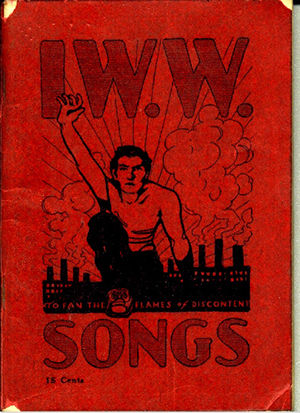
On this date in 1909 the Industrial Workers of the World (IWW), founded in 1905, released the first edition of its Little Red Songbook.
The Little Red Songbook, also known as “I.W.W. Songs” or “Songs of the Industrial Workers of the World,” is a compilation of tunes, hymns, and songs used by the IWW to help build morale, promote solidarity, and lift the bleak spirits of the working class. Its small size enabled a worker to easily carry it in a shirt or pants pocket.
Since the founding of the IWW, songs have played a big part in spreading the message of the One Big Union. Many of them were parodies of hymn tunes captured on street corners from Salvation Army recruiters, and some openly satirized the hold of religion on the people.
The Songbook was first published by a committee of Spokane, Wash. locals, and was originally called “Songs of the Workers, on the Road, in the Jungles, and in the Shops – Songs to Fan the Flames of Discontent.” It includes songs written by radical poets and writers such as Richard Brazier, Ralph Chaplin, Covington Hall, Laura Payne Emerson, and T-Bone Slim. The early editions contain many of the labor songs that are still famous, such as “The Red Flag,” “The Internationale,” and “Solidarity Forever.” Thirty-six editions were published between 1909 and 1995.
The first song by Joe Hill that appeared in the songbook was “The Preacher and the Slave” in 1911, his parody of the hymn “The Sweet Bye and Bye.” The 1912 edition carried his first Wobbly cartoon.
The songs included in the evolving songbook were meant to educate, illuminate and agitate, countering bourgeois mentality and anticipating a new social order, the commonwealth of toil. With their clever use of humor, these songs were more widely read and appreciated than the hundreds of manifestos, pamphlets, documents and declarations that emanated from the American left over many decades.
These songs were sung on picket lines, in hobo jungles, union halls, free speech rallies, and mass meetings. Ralph Chaplin’s “Solidarity Forever” eventually became American labor’s national anthem, closely followed by the Earl Robinson-Alfred Hayes 1936 song “Joe Hill,” which came out of the Communist Party’s Popular Front period.
Over the years various editors have deleted songs that were no longer relevant, and others that dealt in a dated manner with gender or with controversial issues such as job action, sabotage or relations with other factions on the left. Other lyrics had been set to music that was no longer popular or familiar.
A “Canadian I.W.W. Songbook,” compiled and edited by Jerzy (George) Dymny, featuring 41 songs with a Canadian slant, was published in 1990. An edition commemorating the centennial of the IWW’s founding in 1905 was published in 2005. The latest edition of the Little Red Songbook was printed in 2010.
The 190 different songs included in the Little Red Songbook between 1909 and 1973 are collected and annotated in The Big Red Songbook, edited by Archie Green, David Roediger, and Franklin Rosemont and published in 2007.
The Little Red Songbook is still in print today. It is especially relevant in 2015 as this November 19 is the centennial of the Salt Lake City execution of Joe Hill on a trumped-up murder charge. There will be dozens, if not hundreds of concerts and tributes to labor’s minstrel around the country and abroad, and his songs will ring out with ever more resonance. Watch for local announcements and join the choir!
Adapted from the Encyclopedia of the American Left, Wikipedia, and other sources. Amusingly, the Wikipedia entry on The Little Red Songbook advises: “Not to be confused with Mao’s Little Red Book.”
Photo: Wikimedia (CC)

MOST POPULAR TODAY

‘Warning! This product supports genocide’: Michigan group aims to educate consumers

After months of denial, U.S. admits to running Ukraine biolabs

Ohio: Franklin County treasurer attends Netanyahu meeting, steps up Israel Bond purchases

“Trail of Tears Walk” commemorates Native Americans’ forced removal

Hold the communism, please: SFMOMA’s Diego Rivera exhibit downplays artist’s radical politics






Comments